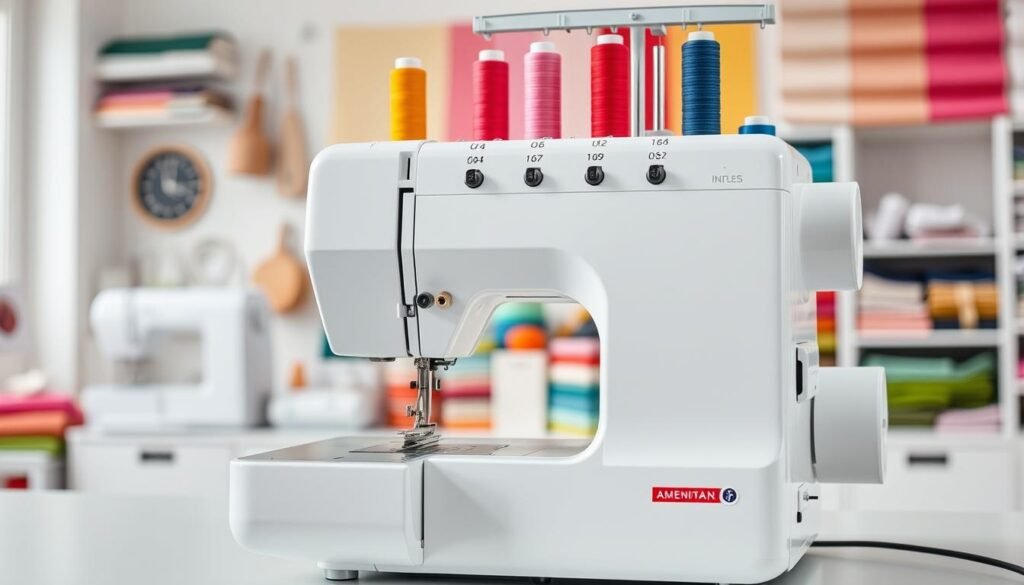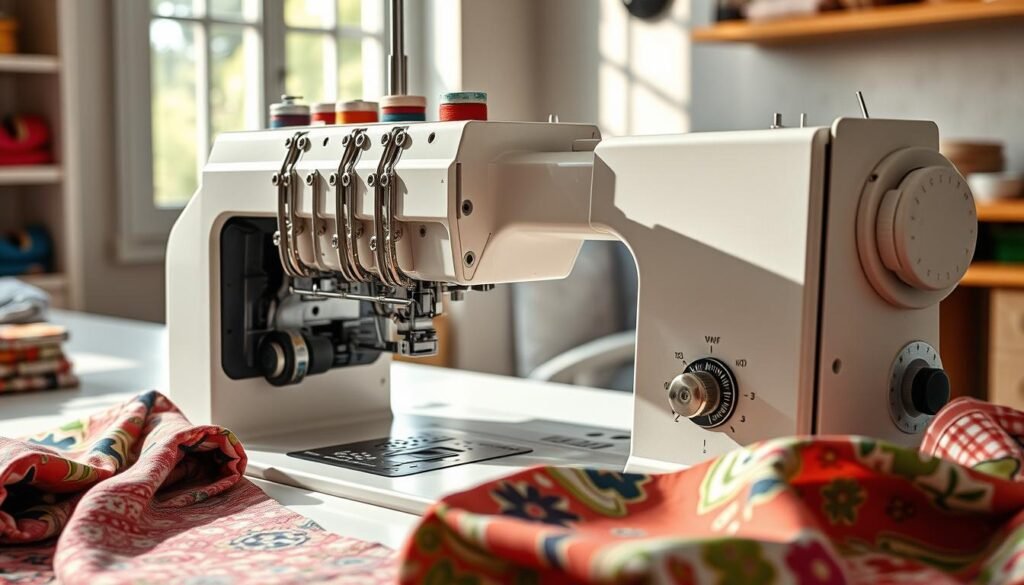Choosing the right overlock serger is key in your sewing journey. It matters whether you’re sewing casually, quilting, or doing professional projects. This guide will help you get to know the important things about an overlocker machine. We aim to help both new sewists and those with experience make good choices. Let’s look into how serger sewing works, the stitches you can do, the top features, and tips for keeping your machine working well.
Key Takeaways
- Understand what an overlock serger is and how it enhances sewing projects.
- Learn key features to look for, including threading mechanisms and stitch varieties.
- Discover the benefits of using an overlocker machine for various fabrics.
- Find tips on selecting the right serger threads and needles.
- Explore the importance of differential feed for better fabric handling.
What is an Overlock Serger?
An overlock serger is a unique serger machine used to edge and finish seams. It can cut extra fabric while stitching edges securely, giving a neat look. Unlike traditional sewing machines, it often uses several threads. This adds strength and stretch to every seam.
The overlock serger is great for projects with knit fabrics or for quick garment making. There are different models, each with various features like rolled hems or flatlock stitches. Knowing what each model offers helps in picking the perfect one for your projects.
Key Features to Look for in an Overlock Serger
When choosing an overlock serger, key features can make a big difference. These features affect how the machine works, your work speed, and the look of your completed work. Consider these points:
Threading Mechanism
Any overlock serger needs a good threading system. Many new models have automatic or easy threading. This feature cuts down the setup time. It lets you spend more time on your sewing projects. It’s also great for beginners who might find complex setups hard.
Number of Threads
The number of threads an overlock serger uses affects your stitch choices. Most sergers use 3 or 4 threads, which is fine for basic tasks. But, some high-end models can use up to 8 threads. This allows for more complex stitches like rolled hems and flatlocking.
Speed and Power
Looking at speed and power is key when picking a serger. The speed, shown as stitches per minute (SPM), tells you how fast you can work. A strong motor can deal with thick materials and many layers easily. Always check for adjustable settings. This lets you change stitch size and work with different fabrics well.
| Feature | Benefits |
|---|---|
| Threading Mechanism | Fast and user-friendly setup, reduces the time to start sewing. |
| Number of Threads | Increases stitch variety and flexibility for different sewing needs. |
| Speed and Power | Ability to work with thick fabrics and handle multiple layers efficiently. |
| Adjustable Settings | Customizes stitch length and width for a perfect finish. |
Understanding Overlock Stitches
Overlock stitches are key in sewing, especially when using a serger. They trim and secure fabric edges to stop fraying. This makes them perfect for many projects.
Different stitch types are made for different purposes. The most known include:
- 3-thread overlock: Great for lightweight fabric seams. It adds little bulk.
- 4-thread overlock: Provides more security. It’s good for knitwear, keeping it durable and flexible.
- Rolled hem stitches: Best for fine fabrics like chiffon. It gives a neat, professional edge to clothes.
Knowing these stitch types and when to use them is crucial. They help you master sewing techniques. The right overlock stitch can make your work look better and last longer.
| Stitch Type | Description | Best for |
|---|---|---|
| 3-thread overlock | Lightweight seam construction | Lightweight fabrics |
| 4-thread overlock | Stronger seam with added security | Knitwear and heavy fabrics |
| Rolled hem | Finishing delicate edges | Chiffon and lace |
Benefits of Using an Overlock Serging Machine
Sergers offer many perks for those who love to sew. They work fast, thanks to their fast operation. This means you can sew and finish edges quicker, making the whole process smoother.
The professional finish sergers give to seams is another big plus. These seams are strong and look neat. This is great for both home projects and professional work. It ensures clothes look good and last long.
Sergers handle all kinds of fabrics well, from knits to stretchy cloth. This makes them very versatile. It also means your clothes will fit better and feel more comfortable. You can tackle many different sewing projects easily.

Knowing these benefits helps sewers unlock their creative potential. With an overlock serger, you can try out new ideas and improve your sewing. It encourages you to be bold and innovative with your projects.
Choosing the Right Serger Threads
Picking the right serger threads is key to great sewing projects. The type of thread not only influences how your seams look but also how strong they are. You’ll often find polyester, cotton, and specialty threads as common choices.
Polyester threads are known for their strength and lasting power. These threads are favored for many sewing needs because they hold up well against wear and tear. They work with both light and heavy fabrics.
Cotton threads are best for working with natural fibers. However, they might not be the best for stretchy materials. Always consider the type of fabric you are using with cotton to make sure your seams stay strong.
Getting the thread tension right is very important. If the tension is off, your stitches might not look good or could even break. Always adjust tension based on the fabric and stitch you’re using. This ensures your project looks good and lasts.
Serger Needles: Types and Selection
Choosing the right serger needles is key for top-notch stitches in your projects. Overlock sergers need special needles to work best. Knowing about different needles will make your sewing better.
- Universal Needles: These needles work well with many fabrics, making them essential for sewers.
- Ballpoint Needles: Made for knit fabrics, ballpoint needles stitch smoothly without damaging stretchy materials.
- Stretch Needles: Ideal for stretchy fabrics and elastics, these needles ensure quality seams and avoid missed stitches.
When picking needles, choosing the right type for your fabric is vital. The correct serger needles improve your sewing and extend fabric life. Knowing each needle’s purpose results in finer and more efficient sewing with your overlock serger.
The Importance of Differential Feed
Differential feed greatly improves sewing techniques, particularly with different fabrics. This feature helps handle fabric better by feeding layers at varied rates. Especially for stretchy or thin fabrics, it’s a game-changer.
Preventing fabric distortion is a key benefit. It keeps delicate materials from puckering or stretching while sewing. This ensures clothes fit perfectly without looking odd.
The enhanced versatility it brings is also worth noting. With differential feed adjustments, you can easily create gathers or rolled hems. This opens up more design possibilities, sparking creativity in your sewing projects.
Learning how to use differential feed can really improve your work. Adjusting settings for different fabrics can make your creations look amazing.
| Feature | Benefits |
|---|---|
| Differential Feed | Maintains fabric integrity, prevents distortion |
| Adjustability | Facilitates gathering and rolling hems |
| Enhanced Versatility | Broadens design possibilities and creativity |
| Sewing Techniques | Improves overall sewing outcomes |
| Fabric Handling | Manages various fabric types effectively |
How to Adjust Serger Tension for Perfect Stitches
Getting the serger tension right is key for perfect stitches. Knowing how tension changes stitch quality is important. Tension controls how tight the threads are during sewing. It really impacts how your seams look and work.
Balanced tension is crucial. You need to make sure all threads are evenly tight. If not, seams may pucker or ruffle, ruining your project.
Be careful with tension adjustments. Always test on scrap fabric before your main project. This lets you adjust without ruining your good fabric.

Right tension makes seams look better and last longer. For the best results, check your serger’s manual for how to adjust tension.
Comparing Overlocker Machines: Brands and Models
When choosing overlocker machines, it helps to compare brands thoroughly. This ensures you find the best serger model for your needs. Different brands have features that can change how you sew.
Brother and Juki are known for reliability. Their machines are easy to use, which is great for everyone from hobbyists to experts.
Bernina and Baby Lock offer high-end options. They come with easy-to-use interfaces and amazing features. These include automatic tension adjustments and innovative threading systems.
When looking at options, make a checklist. Consider things like:
- Price
- Ease of use
- Warranty and service options
- Included accessories
Here’s a table showing features of some popular models:
| Brand | Model | Number of Threads | Special Features | Price Range |
|---|---|---|---|---|
| Brother | 1034D | 3/4 | Easy threading, adjustable stitch width | Under $300 |
| Juki | MO-654DE | 3/4 | Automatic rolled hem, safety switch | Under $400 |
| Bernina | L890 | 4/8 | Automatic tension, dual feed | Over $1,500 |
| Baby Lock | Eclipse DX | 4/5 | Jet-air threading, advanced sewing technology | Over $1,000 |
This guide helps you sift through the many serger models out there. It ensures you pick the best one for your sewing tasks.
Common Seam Finishes with an Overlock Serger
An overlock serger is key for top-notch seam finishes in sewing projects. It lets sewists make strong, good-looking garments. These meet high-quality standards.
- Overlock Seam: This stitch wraps up raw edges well. It suits most fabrics and gives a neat, pro look.
- Flatlock Stitch: Great for sports clothes, it stays smooth on the fabric. It’s stretchy, perfect for activewear.
- Rolled Hem: Best for fine fabrics, this method creates a slim, tidy edge. Ideal for scarves or light clothing.
Learning these seam finishes helps in crafting hems that stop fraying. The serger makes edge-finishing easier, before or after sewing. For a step-by-step guide, check out finishing your edges.
Overlock Serger Maintenance Tips for Longevity
To keep your overlock serger working well, serger maintenance is key. By caring for it properly, you can make your sewing machine last longer and perform better.
- Routine Cleaning: Regularly remove dust and lint from the serger, especially around the feed dogs and threading areas. This simple task can prevent clogs and ensure smooth operation.
- Oiling: Use the manufacturer’s recommended oil to lubricate moving parts periodically. Oiling improves the overall functionality of your overlock serger.
- Proper Storage: Store the serger in a dust-free environment. Investing in a protective cover can shield the machine from dust and debris.
Following these care tips will not only extend your overlock serger’s life but also keep it running smoothly for all your projects. A well-cared-for sewing machine means dependable and efficient service. This makes sewing a lot more fun.
| Maintenance Task | Frequency | Importance for Longevity |
|---|---|---|
| Cleaning | After every project | Prevents dust buildup |
| Oiling | Every 5-10 uses | Ensures smooth operation |
| Storage | Always | Protects from environmental damage |
Conclusion
Choosing the right overlock serger is key to better sewing projects. This guide has shown you the important features and benefits. It also gave tips on keeping your serger in top shape.
Knowing how overlock stitches work can improve your sewing. Using the right tools, like threads and needles, makes a big difference. With good care and correct use, your serger can do wonders for your sewing projects.
Using a serger can make your sewing easier and more fun. Start your next project with the knowledge you’ve gained. You’ll see your creations improve with a good overlock serger.